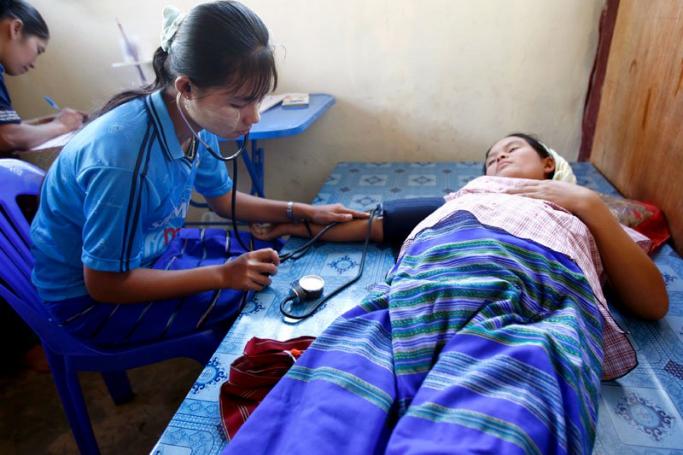Ms Grete Faremo, United Nations Under Secretary-General and Executive Director of UNOPS, urged Myanmar to continue to extend essential health care to poor and vulnerable communities, and pledged to support the development of the country’s health, according to a press release issued on March 26 by the United Nations Office of Project Services or UNOPS.
Ms Faremo made her comments during a visit to Pakokku Township, Magway State, where she saw auxiliary midwives being trained under a programme funded by the Three Millennium Development Goal Fund or 3MDG.
The 3MDG Fund is a US$335 million [K335 billion] fund established in 2012 to support the Ministry of Health’s plans to strengthen health systems and accelerate service delivery, particularly to the poorest and most vulnerable communities in Myanmar. It is supported by Australia, Denmark, the European Union, Sweden, Switzerland, the United Kingdom and the United States of America, and managed by UNOPS.
The training was attended by around 40 women who enrolled in the nationwide programme in response to the Ministry of Health’s plan to deploy at least one trained health care provider to every village. The 3MDG Fund will support the Ministry of Health train more than 5,500 new auxiliary midwives by August 2015, out of a national target of 10,000, further increasing access to essential community health services.
“Despite good progress, access to health services remains a challenge in Myanmar for the poor and disadvantaged groups, in particular minority groups and people living in conflict-affected and hard-to-reach areas,” Ms Faremo said.
“By working with the Government of Myanmar and the 3MDG Fund, UNOPS is delighted to support the training of auxiliary midwives who effectively link the community and the health system, and help adolescents, women and children live healthy lives,” she said.
The trainee auxiliary midwives will acquire essential knowledge and skills. These enable them to complement and assist midwives in delivering primary health care services. In absence of a midwife, an auxiliary midwife can provide preventive care before and after pregnancy, delivery care and care for the newborn. She also gathers information about births, deaths and contraceptive use so that the system can better support the community, according to the press release.
Support for this national training programme is part of the 3MDG Fund’s strategic support to the Ministry of Health’s plan to increase the responsiveness of health systems in order to better meet the health needs of all population across Myanmar, and attaining the priorities for Universal Health Coverage.
You are viewing the old site.
Please update your bookmark to https://eng.mizzima.com.
Mizzima Weekly Magazine Issue...
14 December 2023
Spring Revolution Daily News f...
13 December 2023
New UK Burma sanctions welcome...
13 December 2023
Spring Revolution Daily News f...
12 December 2023
Spring Revolution Daily News f...
11 December 2023
Spring Revolution Daily News f...
08 December 2023
Spring Revolution Daily News f...
07 December 2023
Diaspora journalists increasin...
07 December 2023
BBC tax raids put India press freedom in spotlight












